SANTIAGO, CHILE — As protests worldwide rage over U.S. President Donald Trump’s recognition of Jerusalem as the capital city of Israel, along with plans to relocate the U.S. Embassy from Tel Aviv, Latin American countries have been largely united in condemning the decision.
In Chile, outgoing President Michelle Bachelet issued a statement in which she expressed “concern at the U.S. Government’s decision to recognize Jerusalem as Israel’s capital” and declared Israel’s occupation of East Jerusalem “illegal”
Right-wing presidential candidate Sebastian Piñera echoed Bachelet’s statement, saying that Trump’s decision is a “departure from the two-state policy adopted by the United Nations and supported by the majority of countries.”
The Chilean center-left and the right-wing respectively have critiqued Trump’s Jerusalem decision in a manner similar to that of the rest of the international community. However, there is no clear condemnation of the Israeli colonial project, which the U.S. is aiding through its unilateral actions.
Chile’s history can offer insights as to why the government refrains from a forthright statement, such as the one by former presidential candidate Eduardo Artes Bianchi, who prioritized reviewing the Chilean government’s relations with Israel if he was elected.
Artes also issued a strong statement in response to Trump’s unilateral declaration, rejecting imperialism’s “attempt to legitimize, by relocating the embassy to Jerusalem, Israel’s occupation, destruction, annihilation of the Palestinian population and the colonization of all of Palestine.”
Read more by Ramona Wadi
- The Consequences of the Symbolic Recognition of Palestine
- Abbas’ Cybercrime Law Chills and Silences Palestinian Journalists and Dissenters
- How Profit Deals With Protest: The Disappearance Of Argentinian Activist Santiago Maldonado
- Samidoun’s Charlotte Kates Discusses The PA’s Complicity In The Death Of Omar Nayef Zayed
Chile’s dynamics, with regard to governmental ties with Israel and to a lesser extent, support for Palestine, can be juxtaposed against the country’s activism for Palestinians.
Home to the largest community of Palestinians in Latin America, Chile is well-positioned to lead a regional movement in support of Palestine. However, the country’s politics are poisoned by the legacy of Augusto Pinochet’s dictatorship. This has contributed to a mild governmental framework of support for Palestine, which is in line with the majority of the international community’s view of a two-state paradigm.
On Monday, the Palestinian Federation of Chile held a demonstration outside the U.S. Embassy in Santiago to protest Trump’s decision. The Chilean police attempted to restrain the demonstrators and used water cannons in an attempt to disperse the protest.
Mauricio Abu Ghosh, a Palestinian-Chilean with roots in Beit Jala and the Public Relations Officer for the Palestinian Federation in Chile, spoke to MintPress News about the protest:
After being targeted by the water cannons, we marched to the Zionist Embassy, which is five blocks away from the original meeting point. Members of the Palestinian Federation of Chile, the General Union of Palestinian Students, representatives from the student federation of the University of Chile and Senator Eugenio Tuma, who is a Chilean of Palestinian descent, addressed the demonstrators. Senator Tuma declared Trump’s move as a decision by the U.S. to violate international resolutions and take the side of the oppressor against Palestinians. He also commented about how on an international level, people across the world opposed Trump and demonstrated in favour of peace.
Many Chileans demonstrated with us, including Chile’s Socialist Party, the Communist Party, and Alicia Lira from the Association of Families of Executed Political Prisoners (AFEP)”
Common historical trends

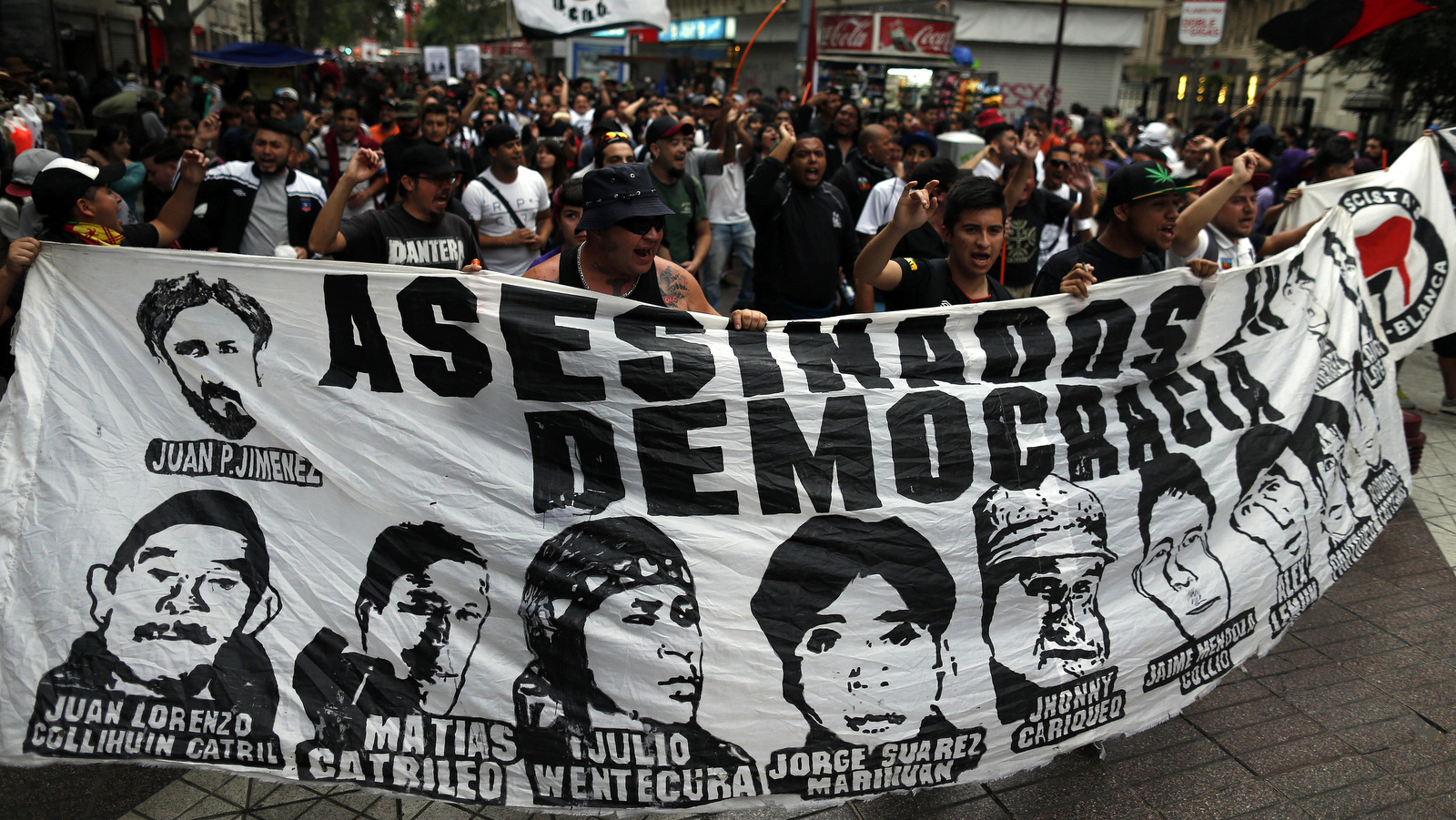
Protesters commemorate the eighth year anniversary of the police killing of Mapuche indigenous activist Matias Catrileo in Santiago, Chile, Jan. 5, 2016, carrying a banner showing the faces of protesters who have died during Chile’s democratic governments. (AP/Luis Hidalgo)
Chile’s history shares many similarities to that of Palestine at two main levels: the struggle of the Mapuche for land reclamation, and the Chilean social struggle against neoliberalism.
Emilio Dabed, a Palestinian-Chilean lawyer who left Chile in 2005 and is now based in Ramallah, explains these dynamics:
During Spanish colonial times, the Mapuche in Chile were subjected to brutal force with the aim of displacing or exterminating the population. During Pinochet’s dictatorship, the Mapuche were targeted by Pinochet’s anti-terror laws and subsequent democratic governments are still availing themselves of this legislation to criminalize Mapuche resistance.
In both cases, Palestinians and the indigenous population in Chile live in a state of exception imposed on them by the colonizers, and under which the colonized people are [seen as] neither citizen-holders of rights nor political subjects but rather a threat — bodies [to be] ruled by violence that is normalized in law.”
For Palestinians, this state of exception can be traced back to the British Mandate that, between 1936 and 1948, was used to repress Palestinian struggle against the Zionist colonial project. From 1967 onwards, Palestinians have been subjected to a military occupation that took a step further, as Dabed explains, toward “quelling any possible form of resistance to oppression and the creation of a whole assemblage of laws, legal exception and a legal regime of discrimination implemented to rule Palestinian citizens of Israel.”

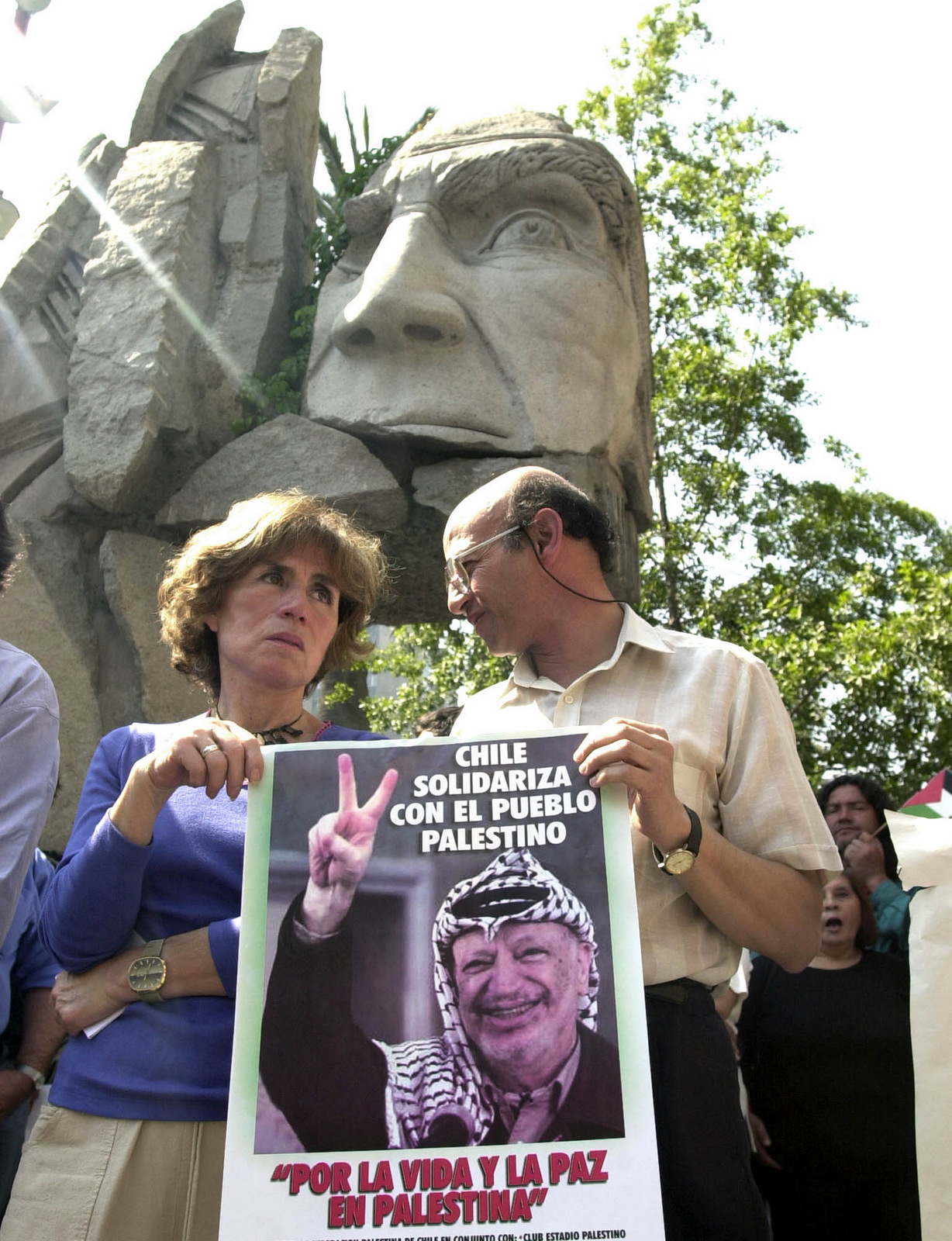
Gladys Marin, participtes in a peaceful protest in support of the Palestinian people in Santiago, Chile, April 3, 2002. The poster reads “Chile is in Solidarity with the Palestinian People,” and “For Life and Peace in Palestine.” (AP/Santiago Llanquin)
Both Palestine and Chile were rendered experimental playgrounds for violence. In Chile, apart from the human-rights violations perpetrated by the Pinochet dictatorship, the neoliberal agenda promoted by the Chicago Boys — a group of Chilean economists trained by Milton Friedman — transformed society into a polarity of extremes and inequalities.
Chilean diplomat and economist Orlando Letelier, who was assassinated by the National Intelligence Directorate (DINA) agents in Washington, had penned an essay in which he described the consequences of neoliberalism upon Chilean society as a system in which “economic freedom and political terror coexist without touching each other.”
Salvador Allende’s political program, which brought about improvement in employment, education and health, was reversed by the Pinochet dictatorship to accommodate the demands of the privileged elite. However, as Letelier stated, the “economic plan had to be enforced,” which, in Chile’s context, required a prior purge through murder and disappearances, a clampdown on unions and organizations, as well as a complete prohibition on freedom of expression.
Abu Ghosh expounds upon the Palestinian and Chilean experience from the dynamics of memory:
Both national experiences are connected by pain, loss of lives, displacement and forced exile. September 11, 1973 is remembered as one of the most painful dates in Chile’s contemporary history. For Palestine, the Nakba, Land Day and Deir Yassin, to name a few, are among the darkest days in history.”
Dabed considers the similarities between Chile and Palestine, noting that the legacy of previous historical outcomes shaped similar neoliberal experiences:
From the late 1970s Chile was a laboratory of neoliberalism under the dictatorship. Pinochet’s defeat in 1989 did not change that. An ad hoc electoral system — part of a designed ‘protected democracy’ for Chile — permitted the consolidation of Pinochet’s social, economic and political heritage. In 2005 when I left Chile, the center-left coalition that had been ruling the country since 1990 was still operating as a mere administrator of the former military government’s legacy.”
Palestine, Dabed says, operated under similar conditions after the Oslo Accords:
Due to the failure of the struggle to implement a process of decolonization and Palestinian national liberation, the [Palestinian Authority] has embarked upon efforts to build the Palestinian economy and institutions according to neoliberal economic and legal parameters, which are compatible with the Israeli colonial design.”
Divisions between the government and the people

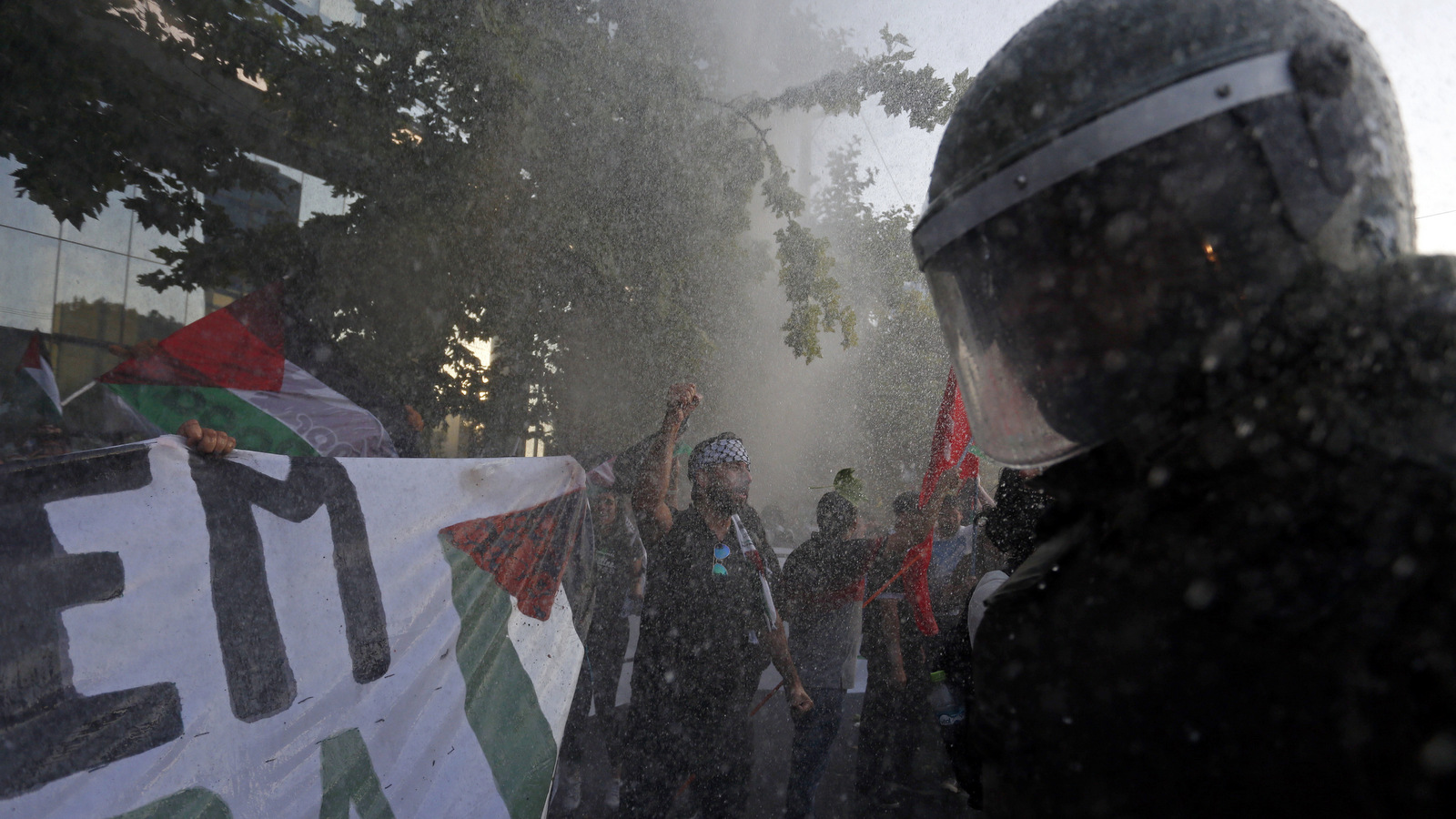
People protest U.S. President Donald Trump’s decision to recognize Jerusalem as Israel’s capital outside the U.S. Embassy in Santiago, Chile, Dec. 11, 2017. (AP/Luis Hidalgo)
Political representation for Palestinians and Chileans, including the Mapuche, remains a divisive issue.
The Palestinian Authority (PA), which is recognized by the international community as the sole legitimate representative of the Palestinian people, is viewed mostly as a collaborator of Israel — particularly due to security coordination, which has resulted in the internal persecution of the Palestinian people.
Land reclamation, which is a priority for Palestinians, has been regularly diluted by the PA’s negotiated compromises with Israel.
Abu Ghosh insisted that despite expulsions and forced displacement, “there is no possibility that Palestinians will give up and stop resisting the military occupation. This is a value that is passed on from generation to generation and it keeps Palestinian identity alive.”
In Chile, the Mapuche remain marginalized through policies that deprive them of adequate access to health and education services. In similar ways to resistance among Palestinians, Mapuche resistance has also been branded as terrorism by the authorities.
Chilean victims of the Pinochet dictatorship, including relatives of the disappeared, are also in conflict with the government over impunity — a lack of disclosed information on behalf of the military which could shed light on hundreds of dictatorship crimes — as well as successive governments’ reluctance to move away from Pinochet’s neoliberal legacy.
Experiences of torture, murder and disappearances, which form part of Chilean collective memory, have contributed to a strong activism that shifts away from government policy to create bonds of solidarity.
In 2016, Alicia Lira, the president of the Association for the Families of Executed Political Prisoners (AFEP), visited Palestine as part of a delegation invited by Palestinian NGO Addameer, prompting her to state that “Palestinians are more helpless than we were during the dictatorship.”
Assimilation to the Zionist agenda

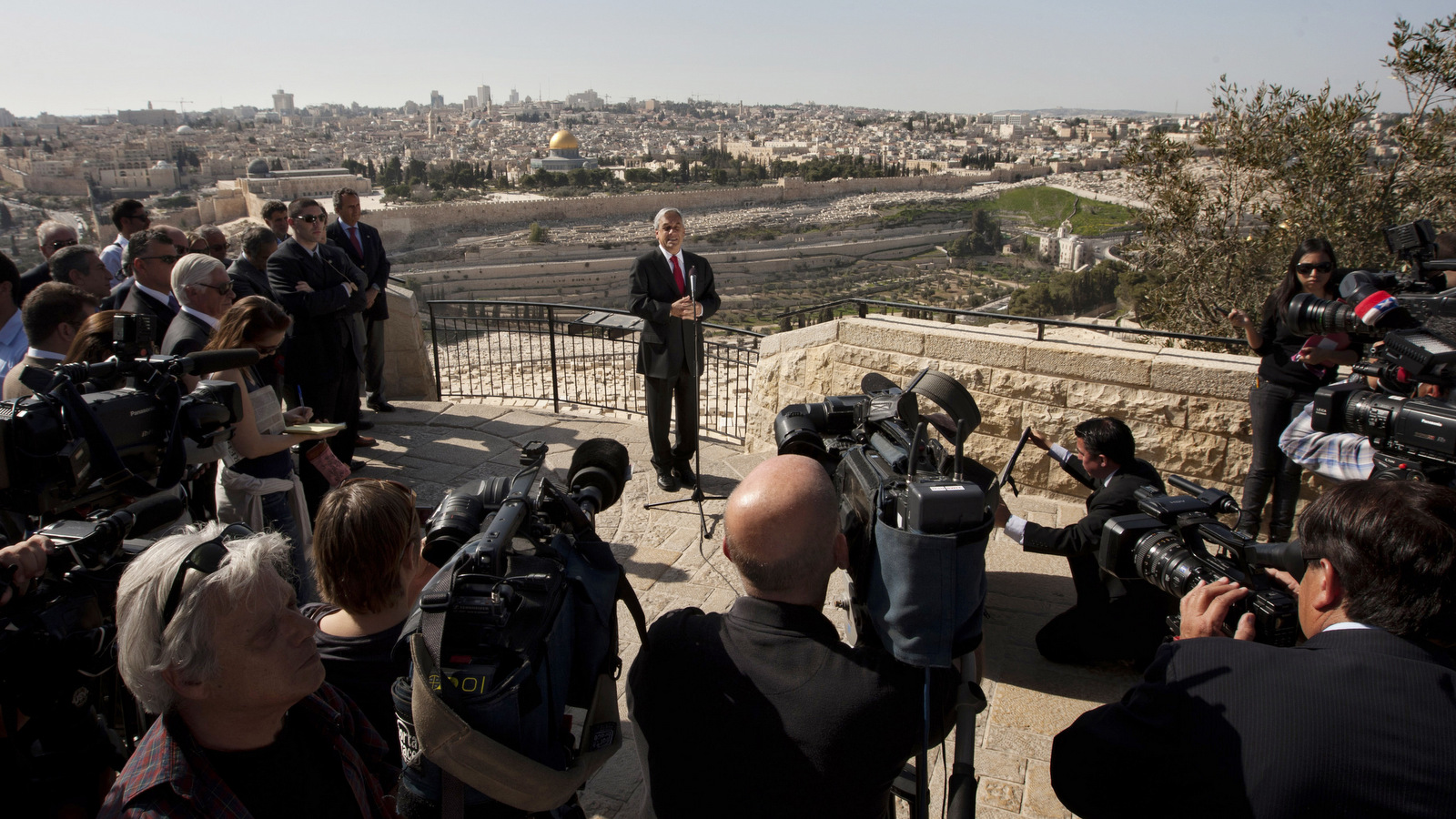
Chile’s President Sebastian Pinera, speaks to journalists on the mount of olives overlooking Jerusalem’s Old city, March 4 , 2011. (AP/Sebastian Scheiner)
While it is known that Pinochet, like other right-wing Latin American governments, retained ties with Israel throughout the dictatorship, Dabed considers the ongoing trend of Chilean government support for Israel as part of the international trend that spans several narratives, including international relations, economic interests and Israeli propaganda. The support for a two-state solution, he explains, is “because they assume that it is based upon international legality. The Israeli state and its supporters have turned world diplomacy, I would say, to Zionist by default.”
While Chilean activism for Palestine has been consistent, contrary to the experience of Chileans and Palestinians, the Chilean government, like other governments in the region and internationally, has been “contradictory” in its approach to support for Palestine. In Abu Ghosh’s words:
We hope that the government will not normalize relations with the state of Israel unless it complies with international resolutions. We are deported when we want to visit Palestine. We are subjected to controls and Israeli humiliation every time we travel. The government, for example, has not helped BDS activists apart from issuing statements of condemnation and those are useless.”
He continued:
[The Chilean government] opens its doors wide to former Israeli soldiers who have their hands stained with innocent blood. The government also seeks security and surveillance advice from Israeli companies which test their technology on Palestinians to prove its effectiveness. Chile is also one of the largest buyers of Israeli weaponry, which is also tested upon Palestinians. This speaks volumes about Chile’s policy to engage in commercial and political policy separately, which we, the Palestinian-Chilean community, do not agree with.”
Chilean-Palestinian activism

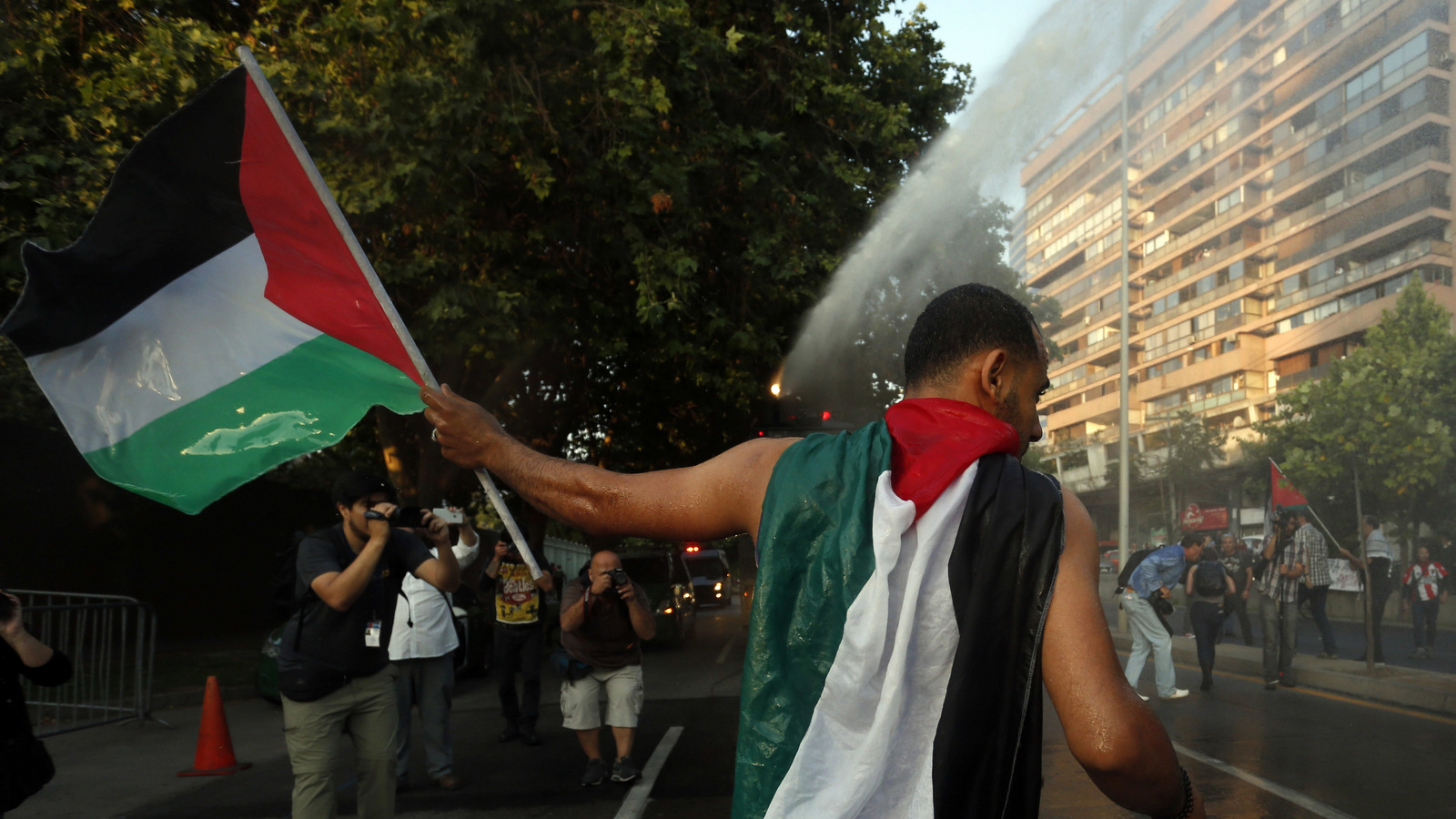
Chileans are hit with police water cannons while protesting U.S. President Donald Trump’s decision to recognize Jerusalem as Israel’s capital, outside the U.S. Embassy in Santiago, Chile, Dec. 11, 2017. (AP/Luis Hidalgo)
Contrary to the Chilean government’s position, Chilean-Palestinian activism has constantly sought to highlight the Palestinian struggle in various ways — from political support to cultural awareness and humanitarian efforts.
Abu Ghosh explains:
Chilean-Palestinian activism has been increasing since the First Intifada in 1987 and reached its highest peak during the 2014 massacres in Gaza. Each decade has surpassed the previous in terms of commitment and solidarity.”
Social media has also altered activism for Palestine. Abu Ghosh notes:
When we were college students in the lates 1980s our goal was to inform and disseminate information about Palestinian resistance against the Israeli occupation. Today, Palestinian activism is more developed due to social media. Each day we have more adherents to the cause and more people willing to protest against Israeli policies and the constant violations of human rights committed by the military occupation.”
Abu Ghosh also notes that, particularly since the Oslo Accords, more effort was exerted to increase and strengthen channels of cooperation.The accords, he states, “were a realization for us that Palestinians were being led to a cliff with no prospect of returning.” Since then, the Palestinian Federation in Chile has been active in maintaining ties between Palestinians in Chile and in the occupied Palestinian territories. “On a sporting level there are agreements between football clubs, such as Deportivo Palestino and al-Khalil, for the exchange of players.”
On a cultural level, Abu Ghosh notes several other initiatives:
There are scholarships awarded by Chilean-Palestinian organizations. There is education and nutrition support for Palestinian children in the Bethlehem district. Each year we bring Palestinian singers to perform in Santiago. There is also an agreement between the Palestinian Federation in Chile and the Palestinian International Institute which offers scholarships for learning Arabic in Amman and Jerusalem.”
In addition, Abu Ghosh stated, the Palestinian Federation of Chile also organizes trips each year for Palestinian Chileans to reconnect with their roots. In the aftermath of Operation Protective Edge in 2014, the Federation also raised $1.5 million to deliver equipment and medicines to Gaza.
Dabed also confirms the role of Palestinian-Chilean activism and involvement in the Palestinian anti-colonial struggle:
The younger generations of the Palestinian community in Chile, in particular, have allowed Chileans and, in general, Latin American citizens to become aware of the Palestinian struggle against Israeli policies. This has increased support of campaigns such as BDS and the creation of other platforms for mobilization in favor of Palestinian rights.”
Dabed also notes an impediment that is common to some Palestinians in the occupied West Bank – the alignment with neoliberal profit. He says:
One impediment for the success of this work is the political and ideological background of some members of the Palestinian community in Chile. It is important for them to realise that the Palestinian struggle also includes the fight of Palestinians against their own authority and its neoliberal policies of pacification and political demobilization.”
In order for Chile to break away from the mainstream perception, it is important to note that, as Dabed states:
The perception of the PA as a national achievement or as a corrupt and useless institution detracts from the fact that the authority has become one of the main obstacles for Palestinian emancipation. Here I think there is a lot of work to be done in Chile and South America in general.”
While the political scenario in Chile is replete with inconsistencies, the shared struggles with Palestinians can make the country a focus point for solidarity activism in the region at a time, as Dabed states, when Palestinians are increasingly looking to Latin America for alliances. He concludes:
I think the potential of Latin America in developing a progressive agenda regarding Palestine is extraordinary and efforts in this sense should be strengthened and supported.”
Top photo | Chileans protest U.S. President Donald Trump’s decision to recognize Jerusalem as Israel’s capital, outside the U.S. Embassy in Santiago, Chile, Dec. 11, 2017. (AP/Luis Hidalgo)
<!–
–>
Source Article from http://www.mintpressnews.com/despite-state-policy-chile-well-placed-to-further-struggle-for-palestine/235499/
 RSS Feed
RSS Feed















 December 15th, 2017
December 15th, 2017  Awake Goy
Awake Goy 
 Posted in
Posted in  Tags:
Tags: 













